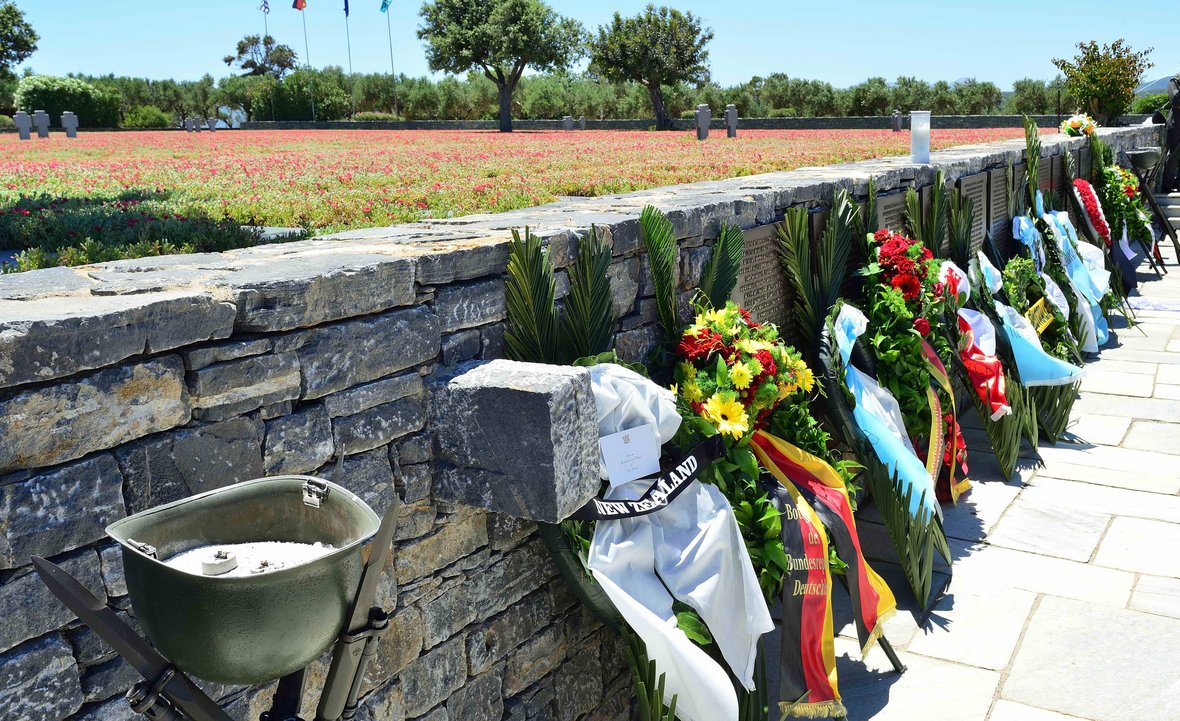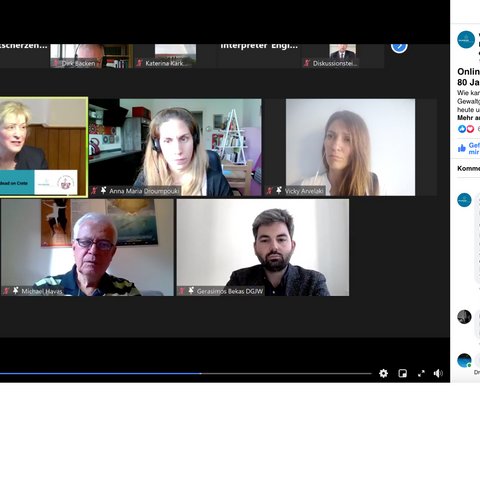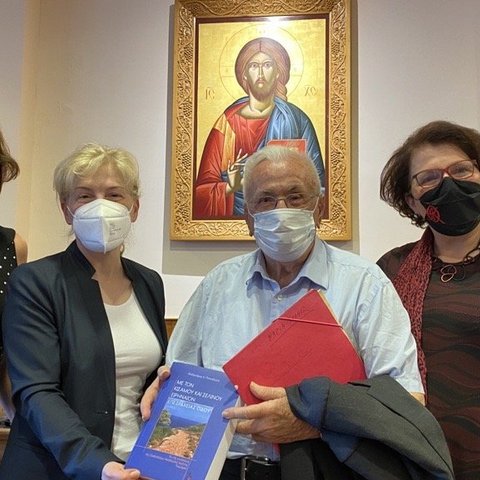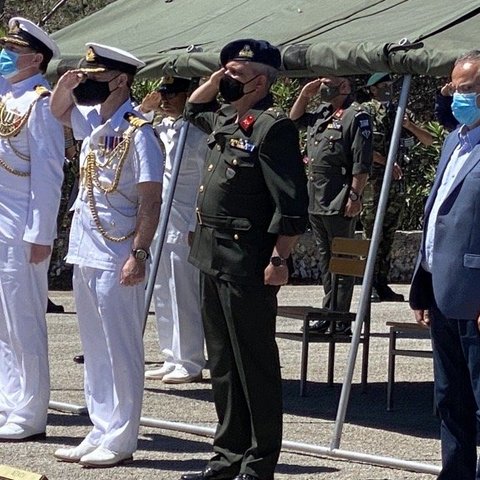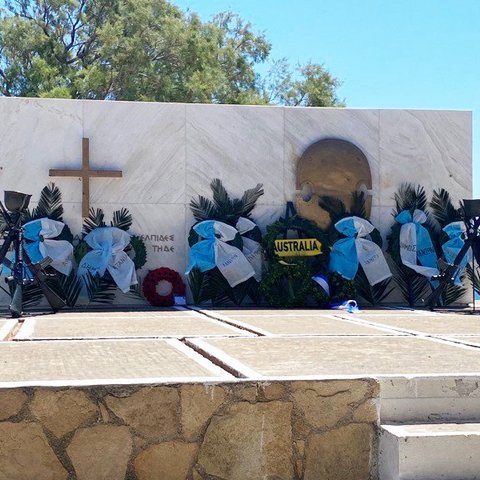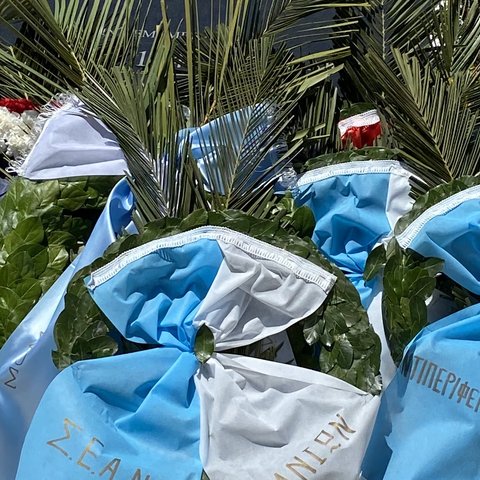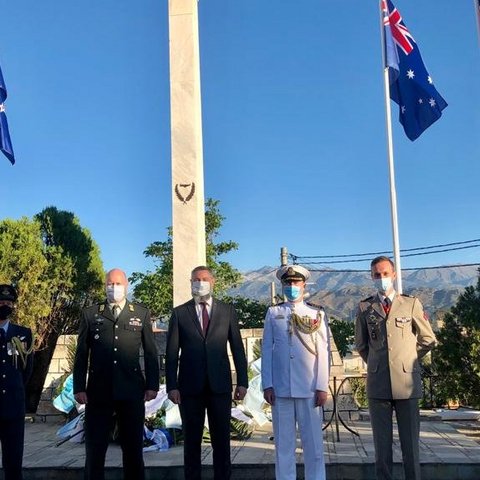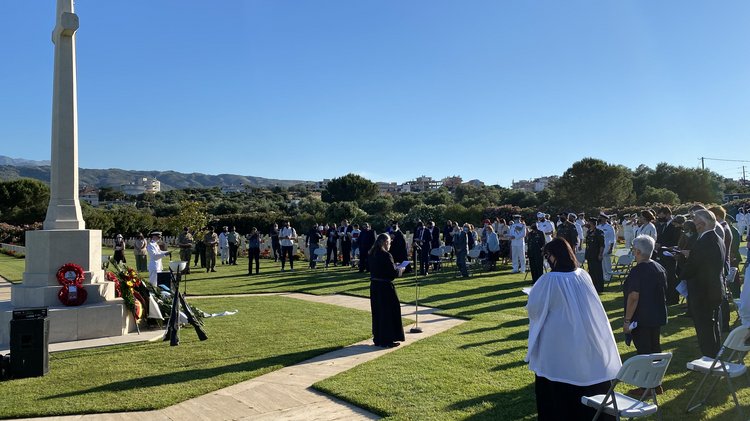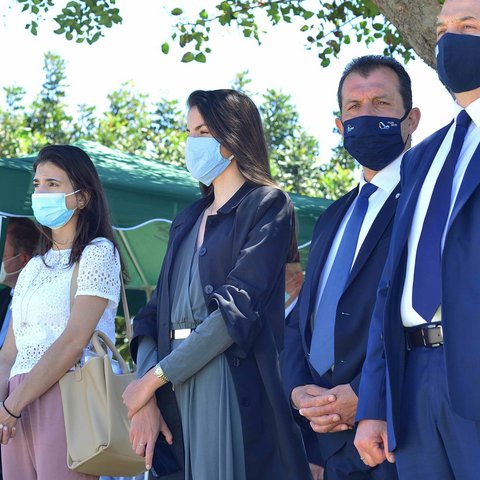
Commemorative ceremonies and panel discussion - 80 years of remembrance of the offensive on Crete
80 Years of the Invasion of Crete: Commemoration at the German War Gravesite in Maleme with International Participation
80 years ago, the Battle of Crete was probably the most spectacular airborne operation of the Second World War – and an immensely costly one at that. During the "Operation Merkur", starting on 20 May 1941, more than 3,000 German paratroopers died, many of them on the first day. 80 years later, Greeks and their former allies from the United Kingdom, Australia and New Zealand commemorate the victims of war and violence. But Germans also came to Crete to remember the days of attack and occupation, including a small delegation from the Volksbund. The event kicked off with a digital panel discussion of the series "Cultures of Remembrance in Dialogue" – streamed live from the Orthodox Academy of Crete.
Panel discussion: “80 years ago – remembering the war dead on Crete”
"Every village has a memorial," observed Vicky Arvelaki, documentary filmmaker. "The people here look back. It is difficult for them to look forward."
Dr Corinna Kuhr-Korolev, a historian from the Leibniz Centre for Contemporary History in Potsdam, saw this as an important clue to the questions of why Greeks and Germans still meet with a lack of understanding 80 years after the war. Kuhr-Korolev moderated the discussion, which was conducted in and translated into three languages. She is also the curator of the new permanent exhibition of the Volksbund at the Maleme War Gravesite.
The historian Dr Anna Maria Droumpouki, who was connected from Berlin from the Selma Stern Centre, recalled the debate on the ratification of the War Graves Convention in Athens in 1962. Foreign Minister Evangelos Averoff had emphasised that the overwhelming majority of Greeks no longer harboured any hatred towards the Germans. However, this was viewed very critically on Crete. This conflict-laden climate can still be felt year after year at the commemoration ceremony in May on Crete.
Loretana de Libero, professor at the German Armed Forces Command and Staff College concluded, "The post-war generation repressed, tried to forget what had happened in the war and what they themselves had done." And she related her reflections to Dr Alexandros K. Papaderos, the former founding director of the Orthodox Academy, who had taken on courier duties for the resistance as a youth and had been imprisoned with his family. Nevertheless, after the war he was one of the decisive pioneers for a rapprochement on the island and the construction of the Maleme German War Gravesite.
Michael Havas, a documentary filmmaker from Prague, has done a lot of work on the Maori, the indigenous people of New Zealand. A Maori unit also fought on Crete in 1941. Decades after the war, Havas visited cemeteries on the island with survivors. The Maori veterans met German visitors there in an open and friendly manner, which led to many personal conversations.
Dirk Backen, Secretary General of the Volksbund, said he was "filled with gratitude" that just a few years after the war, individual personalities on Crete had met the Germans with generous gestures of reconciliation. This paved the way for our present-day togetherness.
The German Ambassador Dr Ernst Reichel – connected from Athens – also emphasised the value of these early steps towards rapprochement, which had led to a politically, economically but also interpersonally close partnership between the countries today and especially on this island. Nevertheless, the diplomat stressed that this relationship could only succeed in the awareness of the ambivalent past.
Gerasimos Bekas, Secretary General of the recently founded German-Greek Youth Office on Crete, emphasised that it was particularly important to encourage young people to engage with history in this way.
The Volksbund has also reacted to these debates in society: At the new permanent exhibition in Maleme, which will be multi-perspective and trilingual, everyone will have their say – "including the victims!" In this way, visitors can take a much greater interest in the fate of the people.
Livestream panel discussion in German
Livestream panel discussion in English
Livestream panel discussion in Greek
White memorial for Greek cadets
On Thursday of this commemoration week on Crete, around 50 Greeks, Britons, Australians, New Zealanders and a delegation from the Volksbund with Professor Loretana de Libero from the Federal Executive Committee remembered the victims of the German attack high above the monastery of Kolymbari, the Monastiri Gonia, at the White Monument to the Greek Cadets.
After a ceremony by representatives of the Orthodox Church, Nikolaos Yannopoulos, commander of the 5th Infantry Brigade, remembered the fallen comrades. The mayor of the municipality of Platanias, where the Maleme German War Gravesite is located, also commemorated the killed cadets.
After the British "God Save The Queen" and the national anthems of New Zealand and Australia, the army music corps intoned the Greek "Ymnos is tin Eleftherian" ("Hymn to Freedom"), politicians and other representatives of civil society sang along vigorously.
Commemoration at the "42nd Street" memorial
On Friday, 21 May 2021, New Zealand Ambassador Anthony Simpson and his Australian counterpart Alex Bush commemorated the victims at the memorial on "42nd Street". Simpson recalled the image of the morning of 20 May 1941, when New Zealanders had breakfast and saw the silhouettes of hundreds of German paratroopers in the sky. This was followed by twelve days of terrible fighting. 671 New Zealanders had died on Crete, among them Maori, the indigenous people of New Zealand. And in their language, the ambassador concluded his speech, "Ka maumahara tont tatou kia ratou – we will remember them".
This was followed in the evening by the Australian commemoration at the ANZAC memorial in Galatas near Chania.
Commemoration at Souda Bay
The ambassadors of the seven allied states that had fought together on Crete laid wreaths at the cemetery in Souda Bay on 22 May 2021. In addition to the ambassador of the United Kingdom, the diplomatic representatives of Canada, Australia, New Zealand, India, South Africa and Greece also attended.
The German Ambassador in Athens, Dr Ernst Reichel, Professor Loretana de Libero for the Volksbund and a delegation of the German Paratroopers Association also laid wreaths. The now 103-year-old Greek General Koka, who had fought as a young man on Crete against the German invaders, was present as a guest of honour.
Commemoration at the Maleme War Gravesite
On 23 May 2021, the German Ambassador in Athens, Dr Ernst Reichel, spoke about the "war of aggression by the Germans" and the war crimes against the Cretan population that followed the invasion, addressing the guests from the United Kingdom, Canada, New Zealand, Australia and especially Greece. Reichel emphasised the necessity of such days and places of remembrance, as the German War Gravesite Maleme is one, "In places like these we feel the absurdity of war and unbridled violence." (the speech in full length can be found here).
Beforehand, retired pastor Helmut Schwalbe from the Protestant church congregation also turned his attention to the feast of Pentecost, when people from different places would speak with one language. He called for people to understand one another better, "so that battles like the one on Crete will never happen again".
Subsequently, the ambassadors of Great Britain, Canada, New Zealand, Australia and Germany laid wreaths. Members of the Hellenic Parliament and representatives of the cities and regions of Crete, the Greek Armed Forces, the Association of German Paratroopers and the Volksbund did the same.
